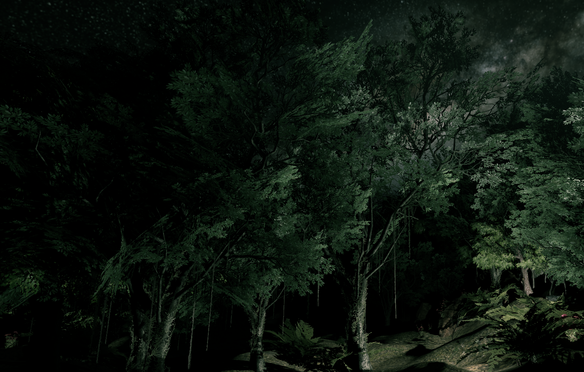 Photo by
Marie Dashkova on Scopio
Photo by
Marie Dashkova on ScopioEvery time a new sequel for a beloved franchise hits the theaters a new wave of angry hysteria hits the Interwebs. The same things happens when the film adaptation of a beloved set of books arrives. No matter how it turns out, someone somewhere is going to begin angrily screaming that the film makers did it wrong, thereby ruining the offended party's childhood. For every one of these fans across every franchise, I have one simple plea: "Breathe."
My entire life has been built on fandom culture but I haven't been a serious, devoted fan of any single franchise since the 80's when Marvel Comics taught me some hard lessons about serialized fiction. I was about thirteen and in the hospital when my mother brought in a random comic book to cheer me up. Other than the occasional issue picked up at a yard sale, superhero comics had never been my thing but here on the cover was a fiercely defiant girl just barely older than me and rendered in the beautiful pencil work of Paul Smith, standing her ground with her back to a wall on the cover and boldly declaring that, "Professor Xavier is a jerk!" on the splash page.
That issue of the X-Men featuring Kitty Pryde front and center remains one of the best comics I ever read. It instantly hooked me on the X-Men in general and on Kitty Pryde specifically. It started me collecting comics and searching through comic stores for back issues to find out what I'd missed. But less than a year later, Paul Smith stopped drawing the X-Men and the magic began its long, miserable decline for my comic-book interest as I slowly learned that not even the best writer can maintain a compelling comic story without an equally talented artist. Then Secret Wars happened.
For those of you not into comics at the time, Secret Wars was Marvel's first big universal crossover of all its titles, hot on the heels of DC's groundbreaking Crisis on Infinite Earths. But where Crisis seemed to have been years in the making and had been lovingly crafted by the fabulously talented artist George Perez, Secret Wars reeked of marketing gimmick thrown together to try to cash in on the energy of DC's successful crossover extravaganza. It was lazily written by then editor-in-chief Jim Shooter and drawn by some artist of middling talent I'd never encountered before. He was incapable of capturing the sort of depth of emotion in a few quick panels that Perez could, so the whole thing came off as raw melodrama.
In the midst of all that melodrama, Shooter destroyed the X-Men for me by turning the sensitive young artist inside the power-house Colossus that Kitty had developed a crush on into a complete jerk who ground her heart under his boot for absolutely no justifiable reason. And then, in the wake of that atrocity, after years of Marvel Comics swearing up and down that Jean Grey was dead dead dead dead dead never coming back so forget about it, and after they'd crafted an amazing story arc teasing us with maybe they'd been lying before finally saying, "Ah, no. Psyche!" they suddenly dragged her back to life after all and started cloning her into as many incarnations as they could come up with at a breakneck pace.
That one-two punch opened my eyes to a cynical truth about fiction: there is no canon. By the time DC started crowing about its upcoming "Death of Superman" event that would get coverage from serious news outlets, I wasn't buying any of it. No fictional character is ever dead so long as there is someone out there who believes money can be made off of his being alive, and where even death can be hand-waved away there is nothing permanent and nothing sacred.
The characters and worlds of popular serial fiction outlive their original creators. Passing from hand to hand to hand, they never escape the imprint -- for better or worse -- of each new creative team. So often we feel that we know these characters as intimately as real life friends, but at the end of the day it all comes back to what I've always told my daughter about her beloved stuffed pig. She used to fret dreadfully over the possibility that they would someday be separated, so I told her straight up that the pig wasn't real like her or me. Her beloved friend wasn't that body. The real pig was the one that existed in her heart and in her mind and would never go away, could never be taken from her. The body was just a temporary convenience for getting hugs.
When the dreadful day came when that little pig body well and truly disappeared forever, I told her about the magic of telepresence robots and pointed out that her personal piggy mythology already included her friend being amazingly tech savvy with all sorts of wonderful toys at her disposal. A few days later she came asking me to help arrange for the arrival of the little pig's telepresence robot. Today it's all but forgotten that the original body went missing and my daughter still has her faithful, lifelong friend never far out of reach.
No one can destroy your favorite characters and your favorite worlds unless you let them, and no creative team owes it to you to keep churning out material that will continue feeding the existence of your personal imaginary friends. Keep the stories you love close to your heart. Reject other stories whole cloth if they don't fit your personal vision.
For me, the X-Men saga started with the founding of the second team and ended with the happily-ever-after in issue #175. Every X-Men story that happened before or since is just alternate universe, "What if?" stuff. Other people can include it in their personal canon and that's fine, but to me it's not "real" and therefore non-threatening. And if you have to keep sharing the lives of your imaginary friends and no one's churning out material in a way you're satisfied with, that's what fan fiction is for. It may not be the ideal solution but it's what we've got.


